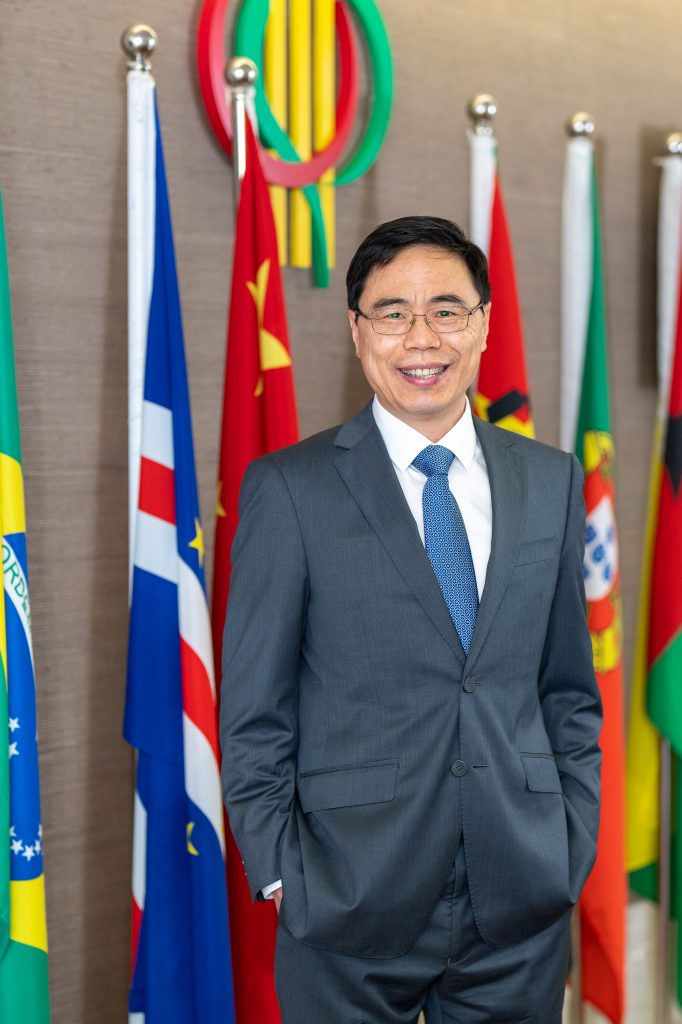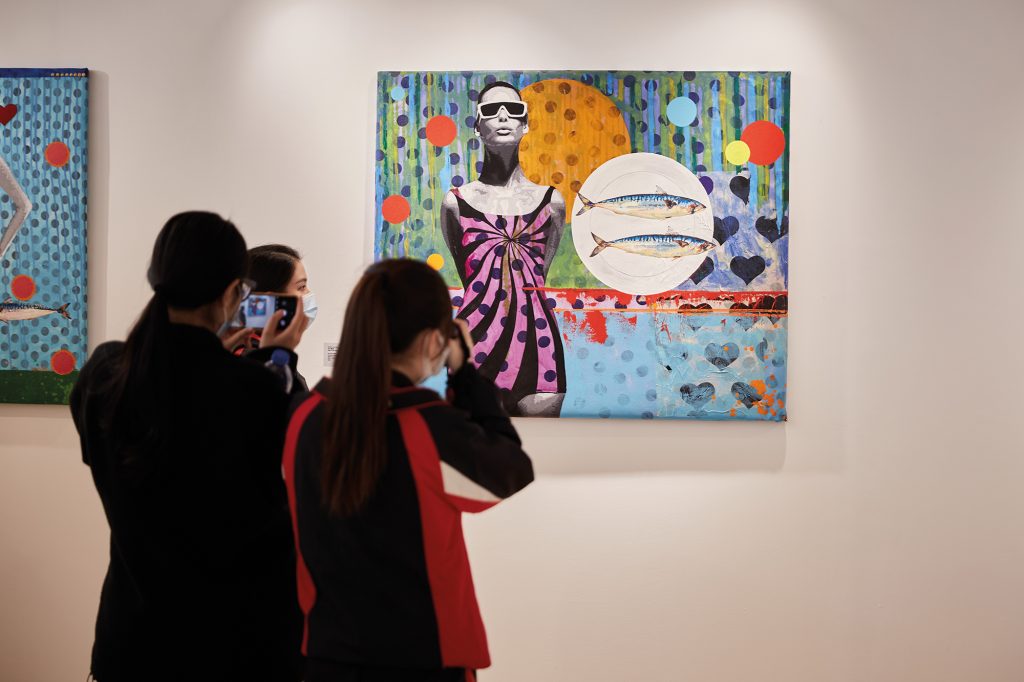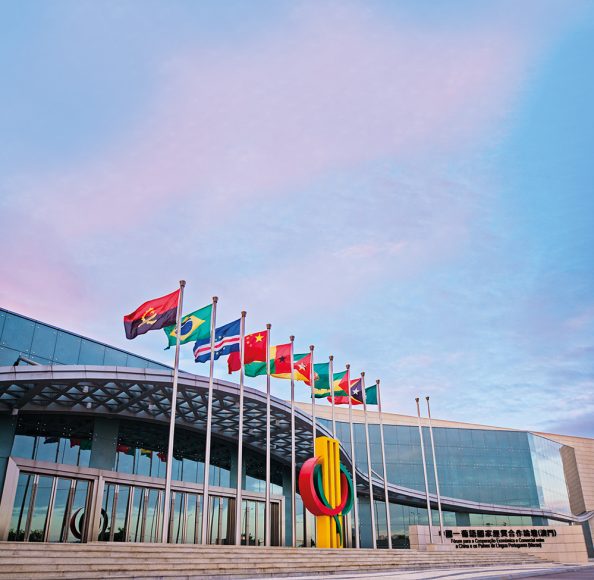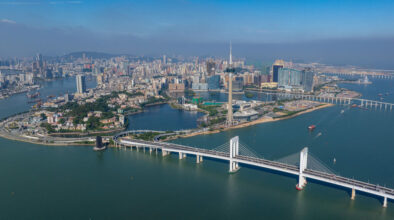The new secretary-general of Permanent Secretariat of the Forum for Economic and Trade Co-operation between China and Portuguese-speaking Countries (Macao) – known in short as Forum Macao – Ji Xianzheng, took office in January, and has already made numerous efforts to share the institution’s future plans and projects. Ji previously served in China’s embassies in Portugal, Spain and Venezuela, and is an expert on the Portuguese-speaking countries (PSCs).

Since Ji’s appointment, he has met with representatives of the central government in Macao, with the city’s Chief Executive, Ho Iat Seng, with secretaries and directors of local government departments, with Macao’s Legislative Assembly and journalists. He has also travelled to Beijing to meet the ambassadors of the Portuguese speaking-countries. Ji spoke to Macao Magazine about the future of Forum Macao and how he intends to strengthen relations at all levels.
How has the Covid-19 pandemic shaped Forum Macao’s work?
The Covid-19 pandemic has caused severe negative impacts globally, especially on the economic and social development of China and PSCs. The appropriate way to face these challenges is to strengthen solidarity and cooperation under the banner of multilateralism, uphold sustainable development, and work together to achieve a community with a common destiny for humanity.
Within the framework of Forum Macao, China and Portugal should step up cooperation on Covid-19, especially with PSCs in Asia and Africa, to help make vaccines accessible and affordable in these countries. On the other hand, we need to take active measures to promote economic recovery. All parties should maintain the stability of the supply chain; encourage commerce between the mainland, Portuguese-speaking nations and Macao; constantly enhance the business and trade environment; boost industrial collaboration; and assist the growth of small and medium-sized businesses.
Since the Covid-19 outbreak, China has been at the forefront of global anti-epidemic cooperation, upholding the priority of vaccines as a public good and playing a leading role in the equitable distribution of vaccines.
China was the first country to commit to treating the Covid-19 vaccine as a global public good, the first to support the exemption of intellectual property rights on vaccines, the first to cooperate with developing countries in vaccine production, and the first to provide more than 2 billion doses of vaccines to more than 120 countries and international organisations, accounting for one-third of the total global vaccines used outside China.
China has announced that it will provide another 1 billion vaccine doses to Africa, with 600 million of them as grant assistance, and a further 400 million doses jointly produced by Chinese enterprises and relevant African countries. A further 150 million doses of vaccines have been sent to countries in the Association of Southeast Asian Nations.
So far, China has provided free assistance to PSCs in Asia and Africa with vaccines and anti-epidemic materials, including testing reagents, masks and protective suits, and it has also actively cooperated with Brazil to produce vaccines locally. Meanwhile, in some PSCs in Asia and Africa, medical teams sent by the Chinese government have been fighting on the front line, saving lives and healing the sick without fear of the epidemic.
In a post-pandemic world, will there be a need to strengthen the cooperation between Chinese and PSC entrepreneurs and companies with visits to the eight participating nations and from those countries to China?
The Permanent Secretariat routinely visits PSCs to learn about the actual market conditions and needs of entrepreneurs there. Prior to the pandemic, the Secretariat organised delegations to the eight PSCs every year to visit relevant government departments, and communicate with local entrepreneurs and business associations. Enterprises in Macao and the mainland also accompanied the [Forum Macao] delegation to carry out trade exchanges in PSCs. Due to Covid-19, however, the Secretariat’s visits to the PSCs have been suspended for two years.
How can Forum Macao help diversify its work into areas other than commercial and economic ones?
The Action Plan on Trade and Economic Cooperation adopted by successive ministerial conferences of Forum Macao is an important document guiding its work. With the continuous development of economic and trade relations between China and PSCs, the areas of cooperation under Forum Macao have been expanded and the content has become more extensive. The Action Plan grew from seven areas covered by the first Ministerial Conference to nearly 20 areas covered by the fifth Ministerial Conference. These include government, investment, trade, agriculture, forestry, animal husbandry and fisheries, finance, human resources, natural resources, production capacity, infrastructure, tourism, transport and communications, culture, radio, film, sports, health, maritime, finance, and other traditional and emerging fields.
Do you think that Forum Macao should further promote the cultures of the PSCs?
Since the establishment of diplomatic ties between the People’s Republic of China and the PSCs, all parties have made concerted efforts to enhance mutual political trust, economic integration and cultural inclusiveness, and bilateral relations have grown steadily.
Forum Macao has always been committed to giving full play to Macao’s role as a platform to promote economic and cultural exchanges between the mainland and PSCs.
Each year since 2008, the Secretariat has successfully held 13 successive Cultural Weeks of China and the PSCs and conducted economic and trade exchanges between the mainland and PSCs to improve understanding of the economies, trade, and cultures of PSCs within mainland provinces and cities. In recent years, the Secretariat has also worked closely with China Central Television and the local mainstream media in Macao to produce promotional videos on the culture of PSCs and display them on various platforms.

The 14th Cultural Week of China and PSCs, organised by the Secretariat, will be held in late 2022 with more content to be prepared and created. At the same time, we’re in contact with embassies in China representing the PSCs to see how we can increase our work together on cultural exchanges and communication.
The Cultural Week of China and PSCs is not simply a one-week event but consists of many “weeks” that span across half the year. Each event is combined with specific workshops to promote the essence of Portuguese-speaking nations’ cultures, drawing a great number of Macao residents and tourists.
What are the synergies between the Greater Bay Area, the development of Hengqin, and Macao as a platform between China and the PSCs?
The Chinese government’s 14th Five-Year Plan supports Macao in consolidating and enhancing its competitive edge and better integrating Macao into the overall development of the country. Macao is actively participating in the development of the GBA and opening a new chapter of cooperation between Guangdong and Macao in the Guangdong-Macao Intensive Cooperation Zone in Hengqin.
These major national strategies were promoted and implemented by the Chinese government, providing greater space for in-depth cooperation between China and PSCs through the Macao platform.
This February, the Secretariat invited officials from the management committee of the Guangdong-Macao Intensive Cooperation Zone in Hengqin to give policy briefings and in the near future, representatives of the Permanent Secretariat of Forum Macao will visit Hengqin for inspection and exchange of views. The Secretariat also plans PSC delegations to visit major cities in the Greater Bay Area within this year, hold exchanges and discussions with local governments and enterprises, and carry out relevant promotional activities providing Covid-19 prevention and control conditions permit.
Macao is using its unique advantages, and strengthening its service platform for cross-border commercial collaboration between China and PSCs. As a result, Macao’s active participation in building the GBA and the enhancement of Macao as a platform between China and the PSCs will help Macao better integrate into China’s overall growth and diversify Macao’s economy in a suitable way.
How can the China-Portuguese-Speaking Countries Cooperation and Development Fund be made more accessible to SMEs?
The fund is jointly initiated and invested by the China Development Bank and the Macao Industrial and Commercial Development Fund, operated and managed by the China-Africa Development Fund. The fund follows market principles, making decisions independently and taking its own risks. Like all commercial funds, there are strict investment standards and requirements.
The financing difficulty of small and medium-sized enterprises (SMEs) is a common problem. The Permanent Secretariat has been seeking project resources through various channels and providing timely project information to the fund to highlight the investment projects of SMEs. The fund has a good understanding of the market environment and the needs of enterprises, they are now studying the demands of relevant enterprises.
How do you see the future of Forum Macao, and how will it innovate and expand its impact?
It has been almost 20 years since the establishment of Forum Macao. A review of the past shows that China and the PSCs have achieved remarkable developments in commerce and investment.
In 2021, the trade volume between China and PSCs exceeded MOP 1.62 trillion (US$200 billion) – a historical high. At present, the international situation has witnessed some new changes and increased uncertainties. At the same time, the willingness of all parties to work together to address common challenges has become stronger, and the potential for development remains huge.
Under these new circumstances, China and the PSCs have made full use of the unique advantages of Macao as a platform to consolidate cooperation, promote post-epidemic economic recovery, and realise promising prospects for common development. I will work with my colleagues in the Permanent Secretariat to build consensus and bring into full play the initiative of all parties, innovate work models and expand work areas, and better serve the development needs of all parties.



